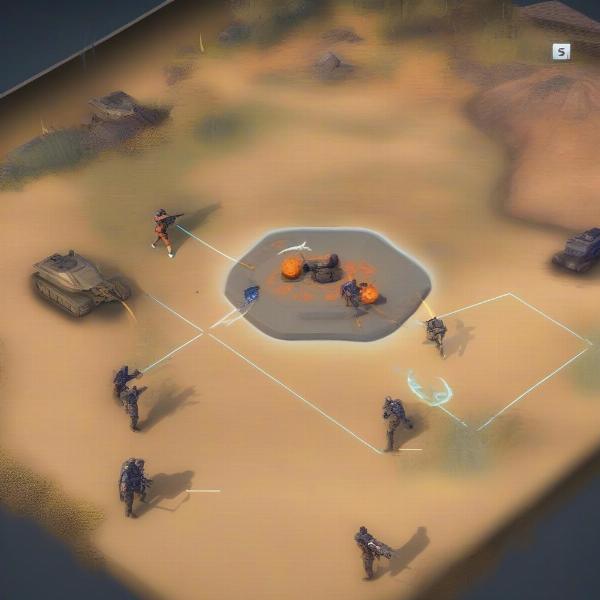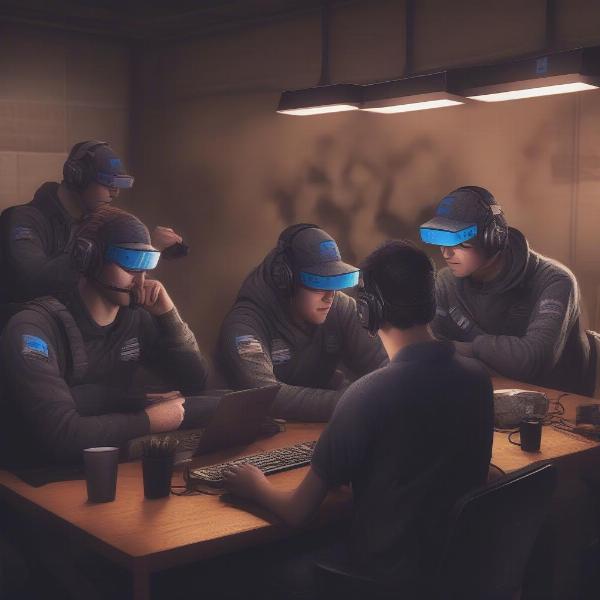Finding the sweet spot between casual fun and competitive readiness in Counter-Strike 2 is a common question for aspiring players. Many wonder how much time they should dedicate to casual matches before diving into the ranked grind. There’s no magic number, but understanding the key factors involved can help you make the best decision for your individual journey.
Bridging the Gap: Casual to Competitive CS2
Transitioning from casual CS2 to competitive requires more than just racking up hours. It’s about developing a strategic mindset, refining your aim, and mastering the game’s intricate mechanics. While casual games offer a relaxed environment, they can be a valuable training ground if approached with the right intention.
The Value of Casual Play
Casual matches provide a low-pressure environment to experiment with different weapons, maps, and strategies. They allow you to familiarize yourself with the game’s core mechanics without the stress of ranked play. This is especially beneficial for new players or those returning to the franchise after a hiatus.
- Map Awareness: Learn the layout of different maps without the pressure of ranked.
- Weapon Familiarity: Experiment with various weapons to find what suits your playstyle.
- Basic Mechanics: Practice movement, aiming, and recoil control in a relaxed setting.
When to Make the Leap
Deciding when to transition to competitive CS2 is a personal choice. Consider these factors:
- Consistent Performance in Casual: Are you regularly topping the scoreboard or contributing significantly to your team’s wins?
- Game Sense Development: Can you anticipate enemy movements and react effectively to different situations?
- Mechanical Proficiency: Are you comfortable with aiming, recoil control, and other core mechanics?
There’s no definitive number of casual games required. Focus on consistent improvement and a solid understanding of the game before diving into ranked.
 Casual CS2 Gameplay Showing Map Awareness and Weapon Usage
Casual CS2 Gameplay Showing Map Awareness and Weapon Usage
Honing Your Skills in Casual
While casual matches shouldn’t be treated as entirely serious, incorporating some structured practice can significantly accelerate your improvement.
- Focus on Specific Skills: Dedicate some casual games to practicing a particular skill, such as aiming or grenade throws.
- Review Your Gameplay: Analyze your matches to identify areas for improvement and adjust your strategies accordingly.
- Play with Purpose: Even in casual, treat each match as an opportunity to learn and improve.
“Casual play offers a valuable sandbox for experimentation and growth. Don’t underestimate its importance in developing a solid foundation for competitive success,” says renowned CS2 coach, Alex “Strategist” Petrov.
Beyond Casual: Preparing for Competitive
Once you feel comfortable with the game’s mechanics and have developed a basic understanding of strategy, it’s time to start thinking about competitive.
The Competitive Mindset
Competitive CS2 requires a different approach than casual play. You need to be more disciplined, communicative, and focused.
- Communication is Key: Effective communication with your team is crucial for success.
- Strategic Depth: Understanding advanced strategies and map control becomes increasingly important.
- Mental Fortitude: Dealing with pressure and maintaining composure under stress is essential.
 Competitive CS2 Teamwork and Communication
Competitive CS2 Teamwork and Communication
Finding Your Competitive Edge
To excel in competitive CS2, you need to identify your strengths and weaknesses and work on improving both.
- Analyze Pro Play: Watching professional CS2 matches can provide valuable insights into advanced strategies and tactics.
- Practice with Purpose: Focus on specific areas of your game that need improvement, such as aiming or decision-making.
- Seek Feedback: Ask experienced players for feedback on your gameplay and identify areas for growth.
“The transition to competitive requires a shift in mindset. It’s about embracing the challenge and constantly striving to improve,” adds esports psychologist, Dr. Emily Carter.
Mastering the Grind: Maintaining Your Competitive Edge
Even after you’ve transitioned to competitive CS2, continuous improvement is crucial for maintaining your edge.
Consistent Practice
Regular practice is essential for staying sharp and adapting to the ever-evolving meta.
- Dedicated Practice Sessions: Set aside specific times for focused practice sessions to work on specific skills.
- Scrimmage Against Other Teams: Playing against other competitive teams can help you refine your strategies and teamwork.
- Stay Updated: Keep up with the latest patches, updates, and meta changes to stay ahead of the curve.
The Importance of Mindset
Maintaining a positive and focused mindset is just as important as mechanical skill.
- Stay Positive: Don’t let losses discourage you. Focus on learning from your mistakes and improving your gameplay.
- Manage Tilt: Learn to recognize and manage tilt to avoid making impulsive decisions that can cost you the game.
- Embrace the Grind: Competitive CS2 is a challenging but rewarding journey. Embrace the grind and enjoy the process of improvement.
Conclusion
The question of “How Many Casual Games Before Competitive Cs2?” doesn’t have a simple answer. It’s about developing a solid foundation, mastering the core mechanics, and cultivating the right mindset. Focus on consistent improvement, strategic thinking, and effective communication, and you’ll be well on your way to competitive success. Now, it’s time to jump into the game and start practicing!
FAQ
- Can I play competitive CS2 without any casual experience? Yes, but starting with casual can provide a valuable learning experience.
- How can I improve my aim in CS2? Regular aim training and focusing on crosshair placement are crucial for improving aim.
- What are some important communication tips for competitive CS2? Clear, concise, and timely communication is key. Use callouts effectively and share information with your team.
- How can I deal with tilt in competitive CS2? Take breaks, focus on your breathing, and remember that it’s just a game.
- What are some good resources for learning CS2 strategies? Watching pro matches and analyzing your own gameplay can provide valuable insights.
- How can I find a team to play competitive CS2 with? Online communities and forums are great places to connect with other players.
- How often should I practice CS2 to improve? Consistent practice, even for short periods, is more effective than infrequent marathon sessions.

